A Monday Afternoon On a Train to Paris
“You get old and you realize
there are no answers,
just stories.”
— Garrison Keillor
=================================================
We have ridden quite a few trains in Europe over the years — short rides between Milano and Varenna, longer rides across Italy, France, Austria. Overall, they have been smooth, comfortable, and convenient experiences. Some have provided stunning views of colorful, expansive countryside. Occasionally, they offered interesting conversations with fascinating people (take a look at one: https://convivio-online.net/?p=1073).
Our trip to Europe this past May/June included three. The first was a pleasant, five-hour ride from Varenna on Lake Como to Antibes at the tip of the French Riviera. The third was a swift, luxurious swoop to London under the English Channel on the Eurostar. In between those, we expected the most interesting part of our second high-speed train ride to be the swaths of bright yellow colza that carpet the three-hour ride from Avignon to Paris.
Instead, it turned out to be a dark page from the hard news stories that we hear nearly every day.
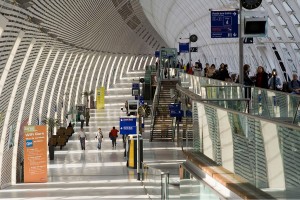 I suppose we could have taken it as a warning sign when we had an unusually difficult time finding the right platform at the Avignon train station. The uniformed attendant we asked to help us find Platform Z dismissed us with a wave and a bored mumble: “Platform Z is the last one” as he walked away to do something more important. Finally, a gentleman in a suit confirmed that we had found the right one.
I suppose we could have taken it as a warning sign when we had an unusually difficult time finding the right platform at the Avignon train station. The uniformed attendant we asked to help us find Platform Z dismissed us with a wave and a bored mumble: “Platform Z is the last one” as he walked away to do something more important. Finally, a gentleman in a suit confirmed that we had found the right one.
So, we found our seats and sped along, passing a pleasant hour enjoying the scenery and talking to a businessman across the aisle who appreciated the on-time reputation of the TGV train service, giving him confidence that he would be able to make the tight connection to the next train so he could be on time for his meeting.
At what seemed to be about half way to Paris, quite in the middle of nowhere, the train slowed to a stop at a concrete facility — not really a station, just a place with flat surface beside the tracks and a sign that said, in English, “Check Point.”
After a minute or two, I began to notice out my window a collection of officers, wearing three different uniforms, assembling beside the train. They began boarding the train at the gap between our first-class car and the car ahead of us, climbing the stairs to the upper car. After a few minutes, a pair of them re-appeared, each gripping with both hands the arm of a short-haired, clean-shaven man, whom they removed from the train and escorted forward out of our sight. Then another pair, similarly escorting another young man, and another, and another, until after an hour or so, we had counted seven who had been removed in the same way. We didn’t see any struggle, as each of those who were being removed walked as directed, eyes straight ahead, while in the firm grip of a pair of large uniforms.
I remember being struck by the fact that no one in our car said a word, we all just watched in silent attention until the businessman across the aisle from me leaned over and murmured, “Libyans, I guess.”
The train slowly began to move until, after 100 yards or so, I heard an audible gasp from the people in our train car. I looked out the window and saw what they saw — about 200 or so men, like those seven we saw escorted from our train, were sitting cross-legged, a few yards apart, hands behind their backs, guarded by an ample number of heavily armed men in uniforms. I gasped myself, as we passed in silence.
After a while, conversations in our car agreed on an estimate of 250-300 individuals. It was stunning to think that so many had been removed from our train — the train we had searched for along the platforms of Avignon station in the bright sunshine of a Monday afternoon, on our way to Paris. The train was an hour late at Paris Nord train station, but we arrived by taxi at our hotel on Rue de Saint-Louis-en-l’ille well in time for dinner.![]()
Headlines Come to Life: This Week in the New York Times
Tourists Traveling Through Europe’s River of Migrants
150 Migrants Feared Dead after Boat Sinks Off Libya
Migrants Transiting Through Macedonia Jam Trains
Hundreds of Migrants Try to Cross English Channel on Trains
Britain and France to Announce Measures to Contain Migrant Crisis
Migrants Race North As Hungary Builds a Border Fence
Bodies of 71 Migrants Found In Truck In Austria
Epilogue
On our second day in Paris after the train ride from Avignon, we walked from our hotel on Rue de Saint-Louis-en-Ille, across the footbridge over the Seine to I’ille de Cité, to visit Notre Dame cathedral. We had been there before and, over the years, we’ve thought of it as one of the most serene places in Europe. We crossed the familiar garden, passed a student group rehearsing a dance performance of some kind, circled around to the front of the church, and stopped at the sight of something we hadn’t quite seen before. We had certainly seen security guards before, around major monuments in Europe, but this was different. Three soldiers — not security guards, but fully uniformed, helmeted, flak-vested, heavily armed members of the French military — were walking purposefully across the courtyard in front of the church, scrutinizing the hundreds of tourists standing in line to go through metal detectors. These two held automatic weapons ‘at the ready.’ A third soldier stood at a distance in the same pose, appearing to be watching out for the other two. We sat down on a bench and watched as two more armed soldiers turned the corner from behind the cathedral.
They looked familiar.
I didn’t photograph them, just as I had not photographed the soldiers I had seen on the train two days before — it somehow didn’t feel like a good idea at the moment.
Europe is changing. Perhaps we are the last to notice.
Click here to download a PDF of this article: ConVivio_Afternoon_train_to_Paris_Aug29_2015
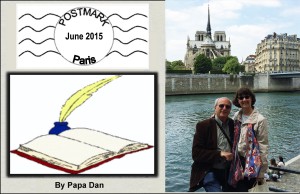
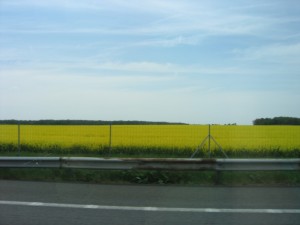
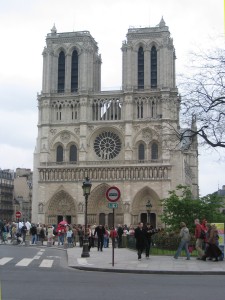
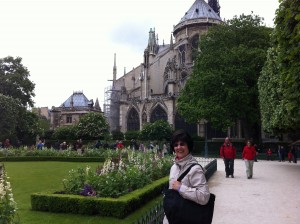
Wow, Dan! I had heard things were bad in France, but what a scary thing for you to go through. Glad you are safely back home.
In view of what happened on the Brussels-Paris train recently this post takes on an even eerier dimension.
Jeannette, I have to say that I don’t think we ever really felt ‘unsafe’ during this trip. We were just amazed at this small glimpse of the migration that was going on around us and these hints of the efforts (mostly behind the scenes) to address it. Given the headlines, this looks like the most massive migration in Europe since the world wars. Can’t see how it will end. I can’t help but think that a “solution” must be found at the source rather than by rounding up the migrants who are running for their lives. Thanks for reading — PapaDan
Dorty, Thanks for reading. Since you have spent so much time in Paris (and are practically a native) I would be interested in your observations of the effects of the stories behind these headlines on life in Paris. — PapaDan
And to think that if Rob was not graduating, Rita and I would have been sitting next to you on that train ride. So glad we were able to share the rest of the trip with you.
And so are we — it was historic for me, Brother Luigi. Glad you got to see the place we have been bragging about all these years — Varenna — and that we got to explore some new territory together: Provence was a treat! Thanks for reading and writing – PapaDan
P.S. Everyone should take a look at: http://bellstreetpress.com/